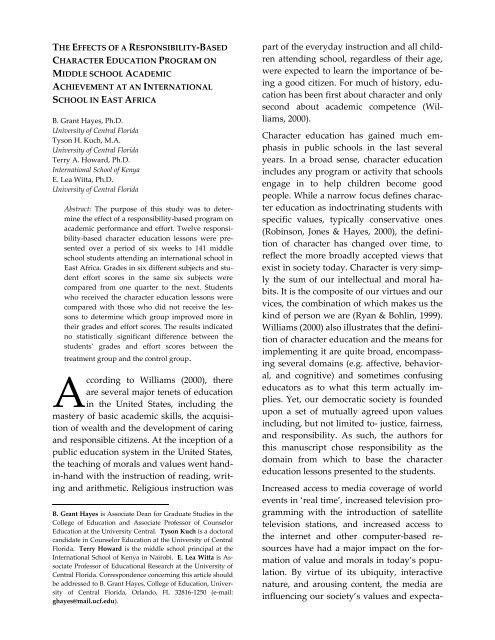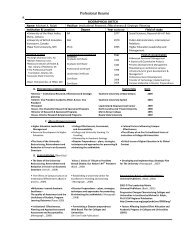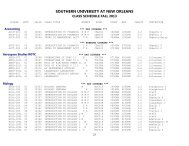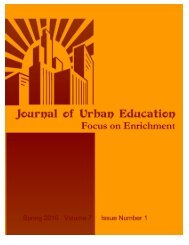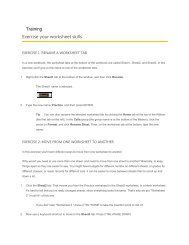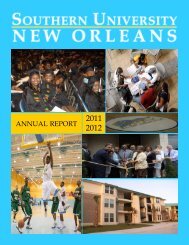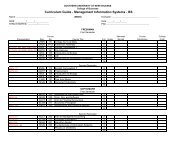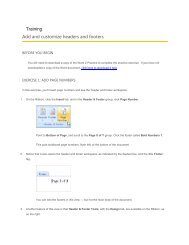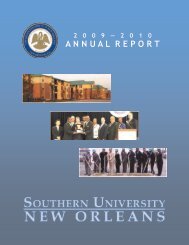Journal of - Southern University New Orleans
Journal of - Southern University New Orleans
Journal of - Southern University New Orleans
- No tags were found...
You also want an ePaper? Increase the reach of your titles
YUMPU automatically turns print PDFs into web optimized ePapers that Google loves.
THE EFFECTS OF A RESPONSIBILITY-BASEDCHARACTER EDUCATION PROGRAM ONMIDDLE SCHOOL ACADEMICACHIEVEMENT AT AN INTERNATIONALSCHOOL IN EAST AFRICAB. Grant Hayes, Ph.D. 1<strong>University</strong> <strong>of</strong> Central FloridaTyson H. Kuch, M.A.<strong>University</strong> <strong>of</strong> Central FloridaTerry A. Howard, Ph.D.International School <strong>of</strong> KenyaE. Lea Witta, Ph.D.<strong>University</strong> <strong>of</strong> Central FloridaAbstract: The purpose <strong>of</strong> this study was to determinethe effect <strong>of</strong> a responsibility-based program onacademic performance and effort. Twelve responsibility-basedcharacter education lessons were presentedover a period <strong>of</strong> six weeks to 141 middleschool students attending an international school inEast Africa. Grades in six different subjects and studenteffort scores in the same six subjects werecompared from one quarter to the next. Studentswho received the character education lessons werecompared with those who did not receive the lessonsto determine which group improved more intheir grades and effort scores. The results indicatedno statistically significant difference between thestudents’ grades and effort scores between thetreatment group and the control group.According to Williams (2000), thereare several major tenets <strong>of</strong> educationin the United States, including themastery <strong>of</strong> basic academic skills, the acquisition<strong>of</strong> wealth and the development <strong>of</strong> caringand responsible citizens. At the inception <strong>of</strong> apublic education system in the United States,the teaching <strong>of</strong> morals and values went handin-handwith the instruction <strong>of</strong> reading, writingand arithmetic. Religious instruction wasB. Grant Hayes is Associate Dean for Graduate Studies in theCollege <strong>of</strong> Education and Associate Pr<strong>of</strong>essor <strong>of</strong> CounselorEducation at the <strong>University</strong> Central. Tyson Kuch is a doctoralcandidate in Counselor Education at the <strong>University</strong> <strong>of</strong> CentralFlorida. Terry Howard is the middle school principal at theInternational School <strong>of</strong> Kenya in Nairobi. E. Lea Witta is AssociatePr<strong>of</strong>essor <strong>of</strong> Educational Research at the <strong>University</strong> <strong>of</strong>Central Florida. Correspondence concerning this article shouldbe addressed to B. Grant Hayes, College <strong>of</strong> Education, <strong>University</strong><strong>of</strong> Central Florida, Orlando, FL 32816-1250 (e-mail:ghayes@mail.ucf.edu).part <strong>of</strong> the everyday instruction and all childrenattending school, regardless <strong>of</strong> their age,were expected to learn the importance <strong>of</strong> beinga good citizen. For much <strong>of</strong> history, educationhas been first about character and onlysecond about academic competence (Williams,2000).Character education has gained much emphasisin public schools in the last severalyears. In a broad sense, character educationincludes any program or activity that schoolsengage in to help children become goodpeople. While a narrow focus defines charactereducation as indoctrinating students withspecific values, typically conservative ones(Robinson, Jones & Hayes, 2000), the definition<strong>of</strong> character has changed over time, toreflect the more broadly accepted views thatexist in society today. Character is very simplythe sum <strong>of</strong> our intellectual and moral habits.It is the composite <strong>of</strong> our virtues and ourvices, the combination <strong>of</strong> which makes us thekind <strong>of</strong> person we are (Ryan & Bohlin, 1999).Williams (2000) also illustrates that the definition<strong>of</strong> character education and the means forimplementing it are quite broad, encompassingseveral domains (e.g. affective, behavioral,and cognitive) and sometimes confusingeducators as to what this term actually implies.Yet, our democratic society is foundedupon a set <strong>of</strong> mutually agreed upon valuesincluding, but not limited to- justice, fairness,and responsibility. As such, the authors forthis manuscript chose responsibility as thedomain from which to base the charactereducation lessons presented to the students.Increased access to media coverage <strong>of</strong> worldevents in ‘real time’, increased television programmingwith the introduction <strong>of</strong> satellitetelevision stations, and increased access tothe internet and other computer-based resourceshave had a major impact on the formation<strong>of</strong> value and morals in today’s population.By virtue <strong>of</strong> its ubiquity, interactivenature, and arousing content, the media areinfluencing our society’s values and expecta-


